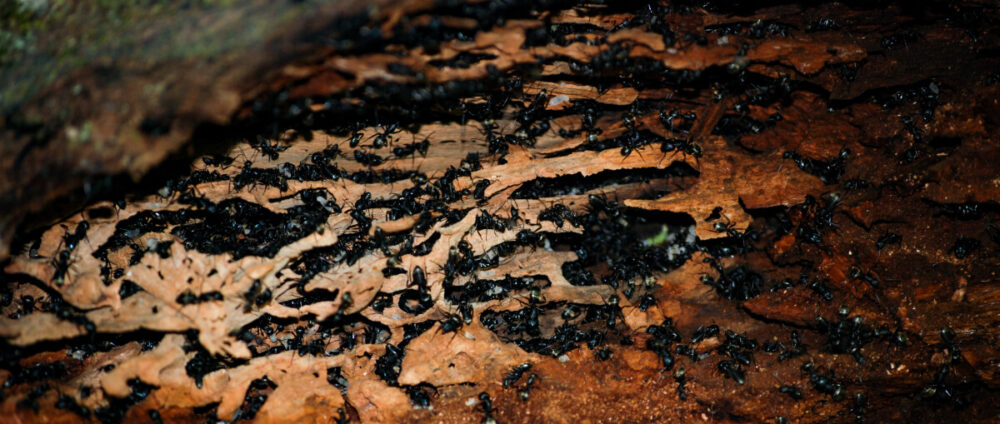
The majority of the recommended pest control methods to get rid of carpenter ants involve using chemical pesticides. Although pesticides are effective for killing an entire colony, they’re not entirely safe and environment-friendly. Fortunately, there are natural solutions for carpenter ant control and elimination that don’t require the use of toxic products and ingredients.
So what are some of the best home treatments for outdoor carpenter ants? You can create natural pesticide sprays using essential oils or make a soapy water solution as a non-toxic repellent. You can also put diatomaceous earth powder directly on the mature colony if you find it. Natural bait stations with boric acid or any kind of sweet bait can also help eradicate carpenter ants.
Carpenter ants are one of the most destructive and invasive species of ants that no one wants to have in their home. But before an infestation breaks out inside your home, these ant species build their parent colonies outdoors within rotting wood, tree stumps, and logs.
If you want to avoid a severe carpenter ant problem, it’s important to immediately address the presence of their colonies outside your property. Here are some of the best natural ways that can help control the population of carpenter ants in your garden and eradicate their colony:
Food-grade diatomaceous earth powder is a natural ant killer that consists of the fossilized remains of tiny organisms called diatoms. These diatoms also largely contain silica, which is a chemical compound that works to kill the carpenter ants by removing their exoskeletons and dehydrating them until they die.
When using DE powder, you can sprinkle them along their scent trail or apply them directly on the carpenter ant colony if you’ve found its location.
Ant baiting is another tried-and-tested method for controlling and eliminating carpenter ants. You can create a homemade ant bait with boric acid, which is a slow-acting poison that can be used as an alternative to other chemical bait ingredients. Boric acid works by upsetting the ants’ digestive systems as well as damaging their exoskeletons.
When using boric acid, it’s best to combine them with a sweet bait like peanut butter, powdered sugar, honey, or jelly to attract the carpenter ants. Place the bait within the vicinity of their nest so the worker or scout ants will easily find them during their search for food. They’ll take the bait and share it with other members of their colony.
You might need to set up multiple bait stations to attract other ants from the satellite nests. Additionally, baits aren’t an instant solution and they can take weeks before the whole colony is killed.
You can also get rid of carpenter ants by spraying them with a soapy water solution. This natural remedy works because soap is said to be toxic to ants and it can suffocate them until they die. To create your own soapy water spray, you can simply mix 2 parts water and one part dish soap in a clean spray bottle.
After shaking the mixture, you can spray it directly on the ants as the solution will stick to their bodies and slowly kill them. You can also use it as an ant repellent by spraying on possible entry points or using it to clean off their pheromone trail.
Another ingredient that you can use for a DIY ant spray is an essential oil product. There are a wide variety of essential oils that carpenter ants dislike such as peppermint, clove, cinnamon, lemongrass, and citrus oils.
In particular, citrus oils contain D-limonene which can kill ants by disrupting their respiratory systems. You can use essential oil sprays to eliminate ants on contact or spritz them along ant trails to keep them away.
If you see a mound of soil in your garden, it’s a sign that you have carpenter ants and although it looks small on the outside, it’s highly likely that there are thousands of ants and multiple colonies beneath it.
You can boil several liters of water and pour them directly on the colony. This will cause the ants inside the nest to drown and effectively reduce their population. Be careful when using this method as there’s a slight risk that you may burn yourself while pouring the water.
Ants hate the smell of cayenne and black pepper. Likewise, these spicy herbs contain capsaicin and piperine which can naturally irritate the mucous membrane of the ants. You can use cayenne pepper or black pepper as a repellent by sprinkling them on the areas where you can usually find ants. You can also combine pepper with boiling water and pour them over the colony to eliminate them.
There are many common species of ants that can be found in neighborhoods in the United States such as pavement ants, odorous house ants, fire ants, and sugar ants. However, carpenter ants are the most concerning species since they can potentially cause structural damage by nesting within your wooden structures.
Carpenter ants can also be a great source of frustration when they’re found nesting outside your house. Here are some of the sites where you can find carpenter ants:
When left undetected for a long period of time, you can see visible carpenter ant damage to your wood structures. To avoid a severe ant problem and protect your property, you need to actively look for the following carpenter ant infestation signs:

Being proactive in controlling carpenter ants outdoors can help avoid a serious infestation inside your home. Here are other preventive measures to keep carpenter ants from entering your house:

Home remedies are a convenient and cost-effective way to manage carpenter ants outdoors. However, not all ants can be eliminated via natural means and you’ll still need expert help from pest control companies to efficiently get rid of your pest problem.
At Yale Pest Control, we have a team of experienced technicians who can treat your outdoor carpenter ant infestation. We provide professional ant control solutions and follow integrated pest management practices to make sure your home is free from ants and other household pests. Contact us now and talk with one of our specialists about your carpenter ant issues.